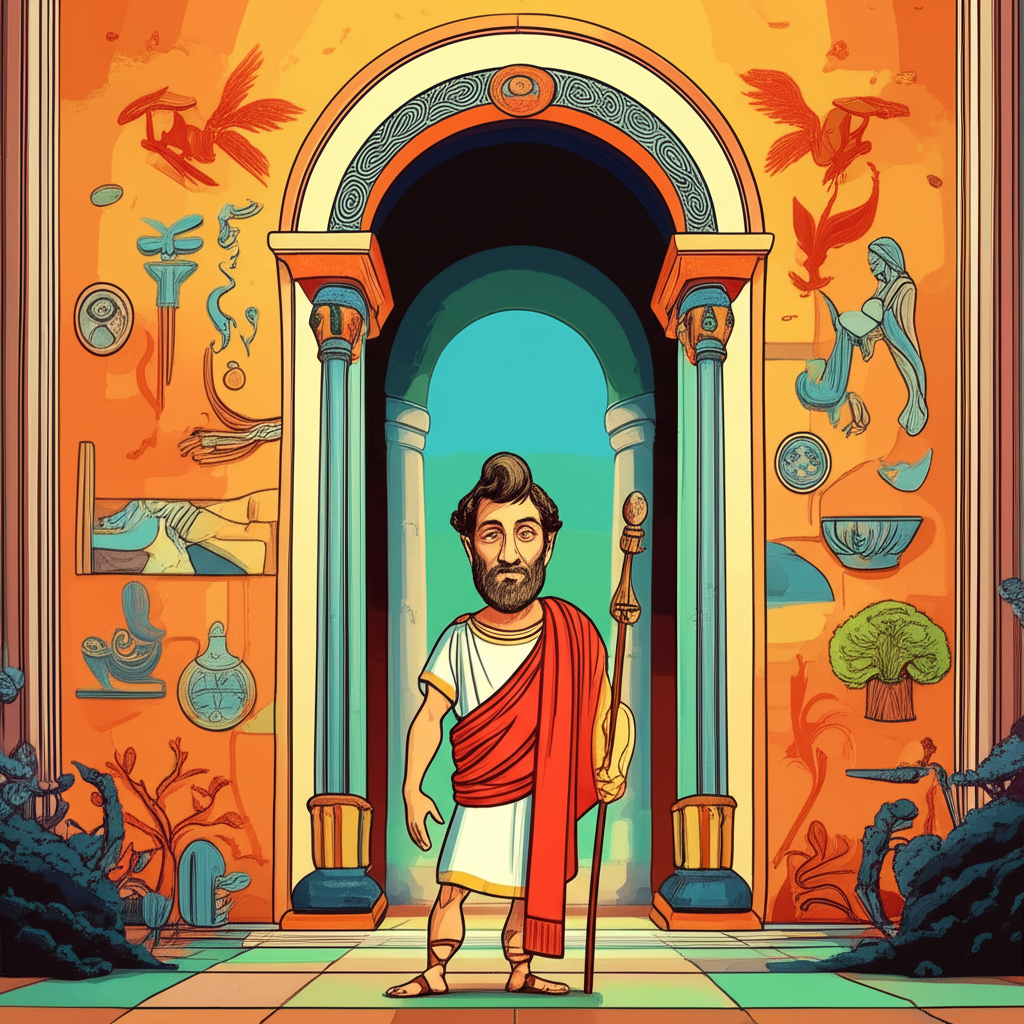
From the sun-drenched shores of ancient Greece, a tapestry woven with gods, heroes, and tales of destiny has been passed down through generations. Among these enduring narratives, the story of the Judgment of Paris and its shadowy connection to the troubled city of Thebes offers a potent glimpse into the worldview of a people who saw the divine interwoven with the mortal, and fate as a powerful, often capricious force. These are not historical accounts to be believed as factual, but rather the profound imaginings of ancient minds grappling with the complexities of life, love, and the consequences of choice.
The world of ancient Greece was a vibrant and often volatile place. Societies were organized around city-states, each with its own patron deities and fierce independence. Their understanding of the cosmos was deeply anthropomorphic; the gods, though immortal and immensely powerful, possessed human-like emotions, desires, and flaws. Natural phenomena, from the fury of a storm to the bounty of a harvest, were often attributed to the whims of these divine beings. In such a context, myths served as a vital cultural glue, explaining the origins of the world, the nature of humanity, and the perceived order of existence. They provided moral frameworks, cautionary tales, and a shared heritage that bound communities together. It was within this rich cultural soil that the stories of the gods and their interactions with mortals, like the Judgment of Paris and the intertwined destiny of Thebes, took root and flourished.
Central to the Judgment of Paris is the figure of Eris, the goddess of discord. Though not often depicted in the grand pantheon of Olympian gods, Eris embodies a primal force. She is often symbolized by the apple of discord, a golden fruit inscribed with the words "to the fairest." Her attributes are not those of beauty or power, but of chaos and instigation. She represents the disruptive element, the spark that ignites conflict, and the unseen hand that can sow seeds of contention. Her presence in the narrative is a reminder that even the most serene gatherings can be shattered by unforeseen provocations.
The story, as it unfolds, begins not on Mount Olympus, but at a grand wedding feast – the union of Peleus and Thetis. All the gods and goddesses were invited, save for Eris, the goddess of discord. Insulted, she sought her revenge. She tossed a golden apple into the midst of the revelers, its inscription a challenge to the assembled deities: "to the fairest." Immediately, three powerful goddesses laid claim to the prize: Hera, queen of the gods and wife of Zeus, associated with marriage, women, and dominion; Athena, goddess of wisdom, warfare, and crafts, embodying strategic prowess and intellect; and Aphrodite, goddess of love, beauty, and desire, representing passion and allure.
Unable to agree amongst themselves, the goddesses turned to Zeus, king of the gods. He, wisely wishing to avoid taking sides in such a delicate matter, delegated the judgment to a mortal – Paris, a prince of Troy, then living as a shepherd on Mount Ida, unaware of his royal lineage. Paris, a handsome and solitary figure, was presented with the three goddesses, each adorned in her finest regalia and each offering a tempting bribe. Hera offered him dominion over all of Asia, immense power and kingship. Athena promised him wisdom and victory in all his battles, the respect of all men. Aphrodite, however, offered him the love of the most beautiful woman in the world.
Young Paris, perhaps swayed by youthful passion or a desire for romantic fulfillment, chose Aphrodite’s gift. This decision, seemingly simple, was a pivotal moment. The goddess of love, true to her word, orchestrated the abduction of Helen, the wife of Menelaus, king of Sparta, and the most beautiful woman in the mortal realm. This act of divine manipulation and mortal folly ignited the flames of the Trojan War, a conflict that would rage for ten long years, resulting in immense bloodshed and the eventual destruction of Troy.
The prophecy of Thebes, while not directly interwoven into the Judgment of Paris itself, casts a long shadow over the broader mythological landscape and often serves as a thematic resonance. Thebes, a city steeped in tragedy and divine curse, was a recurring locus of misfortune in Greek myth. Tales of Oedipus and his unwitting parricide and incest, the ensuing conflict between his sons, Eteocles and Polynices, and the devastating war of the Seven Against Thebes all point to a city seemingly destined for suffering. The prophecy, often vague but always dire, spoke of the city’s inevitable downfall, a consequence of the hubris and moral failings of its inhabitants and even its gods.
In this context, the Judgment of Paris can be seen as a microcosm of the larger forces at play in the Greek worldview. The story symbolizes the inherent dangers of pride and vanity (represented by the goddesses’ claims) and the devastating consequences of misguided choices and external temptation (Paris’s decision). It highlights the concept of fate, suggesting that even seemingly small events, influenced by divine will or whim, can set in motion catastrophic chains of events. The gods, in their own dramas, directly impact the mortal world, their judgments and desires shaping the destinies of cities and individuals alike. The beauty of Helen, while the immediate cause of the war, can also be seen as a symbol of something precious and desirable that, when improperly obtained or possessed, leads to ruin.
The story of the Judgment of Paris and its thematic connection to the doom of cities like Thebes continues to resonate in modern interpretations. These myths are explored in countless literary works, from epic poems to contemporary novels, reinterpreting the characters and their motivations. In film and television, these ancient tales are brought to life, offering visual spectacles of gods and heroes. The world of video games frequently draws upon Greek mythology for its settings, characters, and narrative arcs, allowing players to interact with these legendary figures. In cultural studies, these myths are analyzed for their insights into ancient Greek society, their views on gender, power, and the human condition. They serve as a rich source for understanding the evolution of storytelling and the enduring power of archetypal narratives.
In closing, it is essential to reiterate that the Judgment of Paris and the prophecies of Thebes are not accounts of verifiable events or divine truths. They are powerful cultural narratives, born from the imagination of ancient peoples seeking to understand their world and their place within it. As Muslims, we acknowledge that the only true Creator and Sustainer of the universe is Allah (SWT). These stories, while fascinating from a historical and anthropological perspective, are not to be mistaken for divine revelation. They stand as testament to the enduring human capacity for storytelling, the exploration of complex themes through allegory, and the rich tapestry of cultural heritage that continues to shape our understanding of the past and inspire our present. The tales of gods and mortals, of choices and consequences, remind us of the power of narrative to both reflect and shape human experience across the ages.




